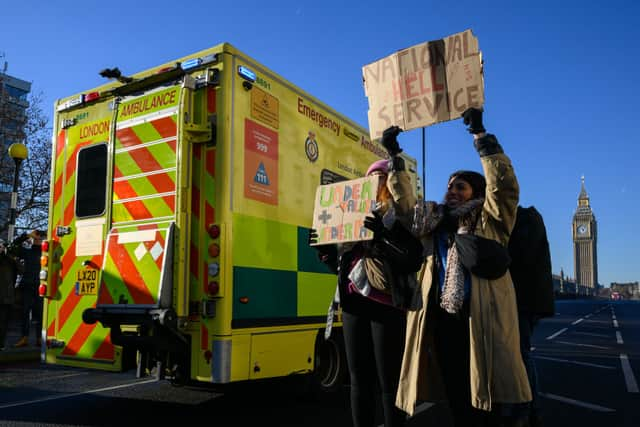Ambulance strikes: Unite workers to stage 10 further strikes as pay row escalates - full list of dates
and live on Freeview channel 276
Ambulance workers will stage a series of fresh strikes as the bitter dispute over pay and staffing escalates, Unite has announced.
The union said its members across England, Wales and Northern Ireland will stage 10 further strikes over the coming weeks and warned additional dates could be announced soon. Unite’s ambulance workers are already set to walk out next Monday (23 January) as the bitter row with the government remains deadlocked.
Advertisement
Hide AdAdvertisement
Hide AdUnite general secretary Sharon Graham said: “Rather than act to protect the NHS and negotiate an end to the dispute, the government has disgracefully chosen to demonise ambulance workers.
“Ministers are deliberately misleading the public about the life and limb cover and who is to blame for excessive deaths. Our members faithfully provide life and limb cover on strike days and it’s not the unions who are not providing minimum service levels.
“It’s this government’s disastrous handling of the NHS that has brought it to breaking point, and as crisis piles on crisis, the prime minister is seen to be washing his hands of the dispute. What a disgrace. What an abdication of leadership.”


The newly-announced strike action will involve Unite’s members in the North West, North East, East Midlands, West Midlands, Wales and Northern Ireland.
Advertisement
Hide AdAdvertisement
Hide AdAs with previous strikes, Unite said its representatives will be working at regional level to agree derogations to ensure that emergency life and limb cover will be in place during the action.
Other derogations will ensure that patients needing life-saving treatment, such as renal care and cancer treatment, will be transported to their appointments, the union added.
Unite official Onay Kasab said: “The resolution to this dispute is in the government’s hands. This dispute will only be resolved when it enters into proper negotiations about the current pay dispute.
“The government’s constant attempts to kick the can down the road and its talk about one off payments, or slightly increased pay awards in the future, is simply not good enough to resolve this dispute.”
When are ambulance workers striking?
Advertisement
Hide AdAdvertisement
Hide AdUnite confirmed details of when its members employed by different ambulance trusts will be striking in the latest round of walkouts. The upcoming strike dates are as follows:
West Midlands
- 6 February
- 17 February
- 6 March
- 20 March
North East
- 6 February
- 20 February
- 6 March
- 20 March
North West
- 6 February
- 22 February
- 6 March
- 20 March
East Midlands
- 6 February
- 20 February
- 6 March
- 20 March
Wales
- 6 February
- 20 February
- 6 March
- 20 March
Northern Ireland
- 26 January
- 16 February
- 17 February
- 23 February
- 24 February
Members of the Royal College of Nursing and ambulance workers in the GMB are striking on 6 February, while the GMB has also called strikes on 20 February as well as 6 and 20 March.
NHS to see biggest ever strike on 6 February
Monday 6 Feburary is likely to see the biggest strike action the NHS has ever experienced is after the announcement of the fresh ambulance strikes by the Unite union.
Thousands of nurses from the Royal College of Nursing (RCN) were already scheduled to strike on 6 and 7 February 6 , while the GMB union announced earlier this week that its ambulance workers would join them on 6 February. On Friday morning (20 January), Unite said workers from five ambulance trusts in England and Wales would also join the strike on 6 February. Several other dates of strike action are already scheduled by ambulance workers throughout February and March.
Advertisement
Hide AdAdvertisement
Hide AdThe escalation in industrial action comes after NHS Providers and the NHS Confederation warned of the damage to the NHS caused by prolonged disputes. Thousands more operations and appointments will need to be cancelled over the next few months, while the loss of ambulance workers will lead to long delays or some patients getting no ambulance sent to them at all.
Speaking to broadcasters during a hospital visit earlier this week, Health Secretary Steve Barclay appeared to rule out a 10% pay rise for nurses, insisting it was “not affordable”.
He said: “Well 10% is not affordable, it would be an extra £3.6 billion a year and obviously that would take money away from patient services, essential services that we need to invest in given the backlogs from the pandemic.
“Now, within government we take a whole government approach – of course I have discussions with the Treasury, as do other Secretaries of State, and these things need to be balanced not just with the needs of teachers, with the Education Secretary, or train drivers with the Transport Secretary, but also what’s affordable for your viewers in terms of their own cost-of-living pressures.”
Barclay insisted he was working “constructively” with unions but said he was “disappointed” in the strikes.
Comment Guidelines
National World encourages reader discussion on our stories. User feedback, insights and back-and-forth exchanges add a rich layer of context to reporting. Please review our Community Guidelines before commenting.
